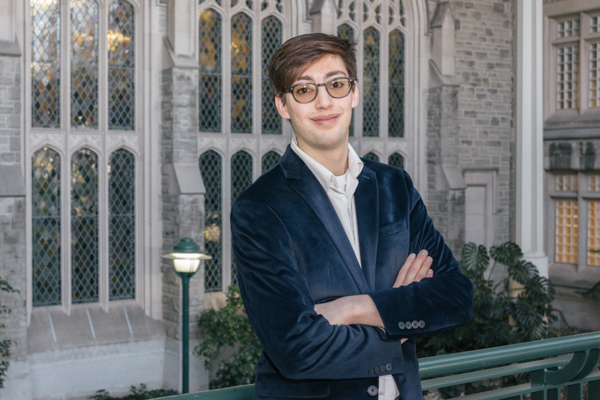Admissions
Equity, Diversity, Inclusion and Decolonization
The School of Graduate and Postdoctoral Studies is committed to equity, diversity, inclusion and decolonization in all aspects of graduate and postdoctoral studies. For more information regarding these commitments please visit grad.uwo.ca/edi-d.
Planetary Science and Exploration
Collaborative SpecializationMeet Zach Morse, PhD candidate in Planetary Science and Exploration

Supervisor: Gordon Osinski
Why did you come to Western for your graduate degree?
Western is one of just a few universities in the US and Canada that offer a graduate program in geology and planetary science. Coming to Western also presented me with an opportunity to live and study outside the United States without traveling too far from home.
Where is “home” for you?
Home for me is the small town of Harpers Ferry, West Virginia. About 45 minutes east of Washington DC.
Describe your research.
I study large-scale impact craters on the surface of the moon. I use high resolution satellite images and topography data to analyze and map material that was ejected from the centre of these impacts during their formation. By mapping the extent of different types of debris from these impacts, including solid rock fragments and molten rock flows, you can get a better understanding of exactly how these impact craters form.
Do you belong to any university or community groups?
I am currently the President of the Western Institute for Earth and Space Exploration Graduate Student Council. As the Western Institute for Earth and Space Exploration is an interdisciplinary graduate program, the graduate council is composed of student representatives from each discipline in the program. We meet to discuss the program and any needs of the students in the planetary science program.
What’s the best advice you could give to someone considering applying to your graduate program?
Space exploration is not limited to just aerospace engineers and astronauts. Geologists, Geographers, Physicists, Chemists, Biologists, and more can all play a role in exploring our Solar System. If you have a strong grounding in any scientific, social science, medical, or even policy background and an interest in space, there is a way to get involved.
Program Websites
Program Contact
Courtney Swinden (cpsx@uwo.ca)Western Institute for Earth and Space Exploration Administrative Coordinator
Western Institute for Earth and Space Exploration
Western UniversityWestern Science Centre Rm 121
London, Ontario N6A 5B7
t. 519-661-2111 ext. 88508
f. 519-488-4721
Participating Degrees
- Astronomy MSc
- Astronomy PhD
- Electrical and Computer Engineering MESc
- Electrical and Computer Engineering PhD
- Geography and Environment MSc
- Geography and Environment PhD
- Geology MSc
- Geology PhD
- Geophysics MSc
- Geophysics PhD
- Mechanical and Materials Engineering Direct Entry PhD
- Mechanical and Materials Engineering MEng
- Mechanical and Materials Engineering MESc
- Mechanical and Materials Engineering PhD
- Physics MSc
- Physics PhD
The Western Institute for Earth and Space Exploration hosts the only planetary science graduate collaborative specialization in Canada. This specialization emphasizes original student research; small group discussion of literature and current developments; an interdisciplinary approach; and hands-on experience gained through laboratory and/or field work. Graduates of this specialization have gone on to careers in industry, government and academia.
Program Length
- MSc - 6 Terms (2 years)
- PhD - 12 Terms (4 years)
Program Design
- Full-time study
- Thesis-based
Funding Information
- The Collaborative Specialization does not provide additional funding beyond what the student receives through their home department. Please visit the Physics & Astronomy, Department of Earth Sciences, Electrical and Computer Engineering, or Geography program description pages for more information about their funding packages.
Applicants are encouraged to apply for the following scholarships (if eligible):
Tuition and Fees
Tuition and fee schedules (per term) are posted on the Office of the Registrar's website at http://www.registrar.uwo.ca/student_finances/fees_refunds/fee_schedules.html
Graduate Student Affordability Calculator
Use this helpful tool to estimate how much money you will need to pay for your tuition, fees, housing, food, and other necessities for a 12-month (three term) academic year.
Admission Requirements
- Prospective students must apply to the graduate program in their department of interest and then specify Planetary Science and Exploration.
- Preferential consideration will be given to applicants with a demonstrated interest in Planetary Science and Exploration as indicated by prior course work, research or involvement in space-related student groups.
Application Deadline
- Variable - Please refer to the prospective home program description page for deadline information






